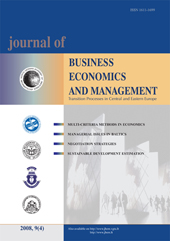
We kindly inform you that, as long as the subject affiliation of our 300.000+ articles is in progress, you might get unsufficient or no results on your third level or second level search. In this case, please broaden your search criteria.












Presented paper aims to reveal differences, if any, in innovative behavior of business firms containing foreign and not foreign capital. Innovative behavior in that case is being characterized by scale of investment into research and development, self-financing pattern and business strategy undertaken by various fi rms. Juxtaposition of business firms operating in the same economy field but having different ownership origin – local and containing foreign capital – has been performed. Results let us identify differences in approach to innovative activity stipulated by presence of foreign capital. Tendencies obtained in Lithuania plausibly might have been verified in other less advanced European countries in order to check if a consistent pattern could be admitted.
More...
The study is based on comparative theoretical research into the concepts of corporate social and environmental responsibilities. Multinational enterprises (MNEs) are responsive to the stakeholders’ needs. Therefore, environmental business management was integrated into model of corporate social responsibility. This demonstrates that social processes influencing corporate social responsibility are of equal importance for the development of environmental responsibility. Simultaneously, this theoretical integration leads to an understanding that corporate environmental responsibility may be also introduced into other theoretical models of social responsibility, which assess impacts of stakeholders and other social influences. The empirical research demonstrates that environmental expectations of stakeholders are different in economically different countries. In addition, the stakeholders differently see the functions of business in environmental issues. Qualitative content analysis disclosed what form of environmental responsibility is proper in countries of developed, developing and emerging economies. In developing economies, donations are demanded most of all; in emerging economies exposed to various transformations, there is a need for social investments; in developed economies full business co-operation is preferred on environmental issues. Most important environmental outcomes of MNEs, as reflected in their annual statements, demonstrate business adaptation to different stakeholders’ expectations built in economically different countries.
More...
Although there is no substantial change on this side, that leaders achieve results through the others work, there are still differences in the way, how leader achieves this. Based on empirical data from Cross Cultural CEO project this paper aims to classify leaders of Estonian organizations. The empirical study involved interviews with CEOs of 63 companies and questionnaires completed by the CEOs and their subordinates. Two types of top managers were received: directive type and team player. Self-organizing theory has been applied for interpreting results. Implications are developed for leadership development in countries in transition.
More...
The aim of this paper is to consider a company engaged in designing and creating a new product and, later on, delivering the latter in large quantities to the market. The product is composed of several sub-products, each of them, in turn, being a subject of several possible versions. The product’s utility comprises both the utility of designing and creating the product’s pattern example as well as the competitive utility to gain the future commercial success. The problem is to determine the income versions of designing sub-products in order to maximize the product’s competitive utility subject to restrictions related to the design process. A two-level search algorithm for the problem’s solution is suggested. The internal level is faced with optimizing the product’s competitive utility by means of experts’ information, while the external level centers on obtaining a routine feasible solution from the point of designing process.
More...
Of all the sub-sectors of the national economy, the banking industry and the property market have arguably been most severely affected by the current recession. Thus, the prevailing credit crunch in real estate finance and market conditions have implication for disposal and valuations of real estate for mortgage purposes. The study examined whether forced sale valuations of mortgage properties were a good proxy for their auction sale prices. Relevant data involving 67 auction sales of foreclosed residential property transactions together with their contemporaneous forced sale valuations were pooled together in Lagos Metropolis during the period 1994 to 2003 from sample of estate surveying and valuation/auctioneering firms, the lending institutions and the Nigeria Deport Insurance Corporation. The data obtained were analyzed with the aid of frequency distributions and multiple regression models. The study revealed, amongst others, that forced sale values are not good proxies for auction sale prices as against the conclusions of previous studies on accuracy of open market valuations either in Nigeria or other countries like UK, USA and Australia. The implications of the foregoing conclusions on the lending decisions and valuation profession in the country were further examined in the paper.
More...
During the last years the changes of social – economic situation have been fast, however, according to individual macroeconomic indexes Lithuania is still significantly below the average of EU countries. To decrease these discrepancies the EU grants the structural support, the use of which is anticipated to establish strong and competitive economy, to train qualified labour force and stimulate social and economic cohesion. The efficient and expedient use of the EU support would enable Lithuania to implement the national Lisbon strategy programme and contribute to the implementation of the very Lisbon strategy guidelines. However, the investigations showed that the use of the support is not sufficient enough to secure the efficient progress of the country. The article analyses the aspects of the EU regional policy financing and the expected results of implementing the Lisbon strategy actions; it analyses economic, social, environmental, and other indexes of the economies of Lithuania and EU countries and assesses the result of the country’s progress in implementing the Lisbon strategy. The research on the expedience of using the EU structural support and its impact on the country’s progress was carried out. The research made on the use of the EU support and its impact on the country’s progress suggests that about two thirds of the measures correspond to the national programme for implementing the Lisbon strategy but only few indicators have a complex influence on the progress indexes. Therefore, while preparing the programmes of the EU support use for 2007–2013 and coordinating them with the EU Commission a better harmonization of this support use measures with the national programme for implementing the Lisbon strategy is necessary, and the measures have to be implemented in a complex manner, as well as the horizontal compatibility of the measures has to be maintained.
More...
Investigations of firms’ pricing decisions and performances have been twofold. While within the industrial organisation framework stress is placed on industry-specific factors and the market power of firms within industries, various organisational theories emphasise the role of ‘soft’ factors in the determination of firms’ performance. The main thesis of our paper is that the size of a firm’s markup can mostly be explained by the firm’s productivity, capital and labour costs, as well as the firm’s market power and organisational structure characteristics, when the external environment and industry membership is controlled for. Our objective is thus to explain firm-level markups by a set of firm-specific factors. The empirical analysis of markup determinants is based on a sample of Slovenian manufacturing firms (NACE 15-37) in the 1994-2003 period, applying panel data regression GLS model and ANOVA analyses. We find that, besides market share and cost factors, organisational structure change occurring after some threshold significantly increases markups.
More...
Interview with Petruška Šustrova about Charta 77, about politics and moral in the Czech Republic in Modova after 1989.
More...
The author reviews the book of Florin Oişteanu: Imaginea evreului în literatura română (The Image of the Jew in Romanian literature)
More...